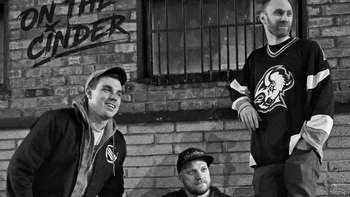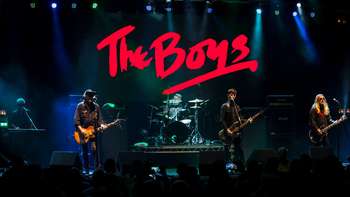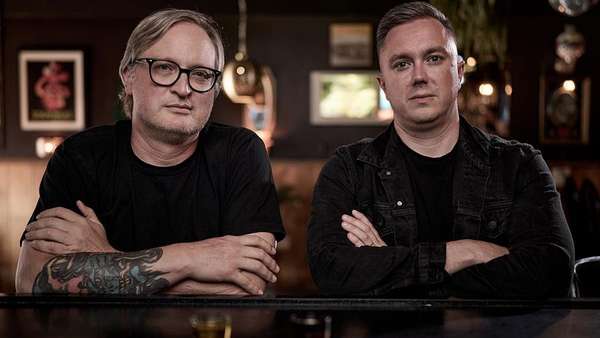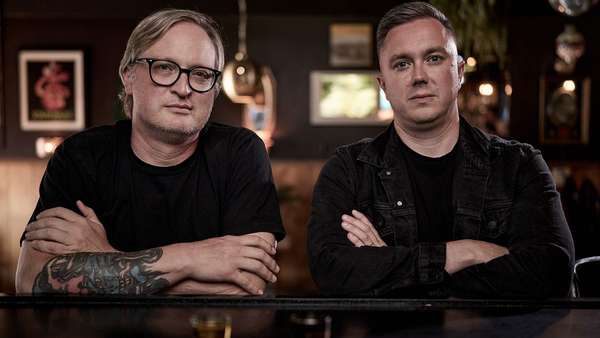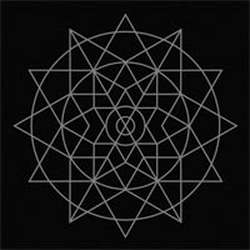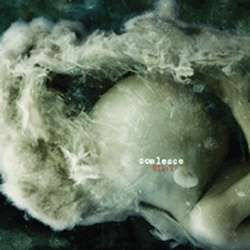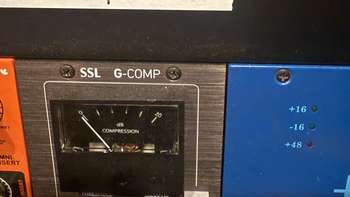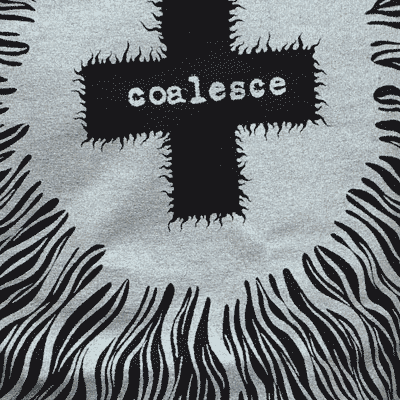
Coalesce is a band that has always been pushing the boundaries of music. From their earliest days with Earache and Edison in the 90's through their current phase as a band today, they have reinvented the sound of hardcore with their off-kilter song structures and the one-of-a-kind vocal assault of Sean Ingram. The band recently reemerged with a new 7", a self-funded and self-released retrospective DVD, and a mini-tour to promote both. Scene Point Blank spoke with guitarist Jes Steinegar about the bands return, recent tour, and what to expect in the future from Coalesce.
Scene Point Blank: Why now? Why raise up Coalesce after a long dormancy?
Jes Steineger: For no reason other than the one we've always used before: because we want to. Dan Askew contacted me in 2005 about an offer to play Hellfest. I saw that there were quite a few reunions at that show and thought, "This would be fun; Coalesce as a retro act alongside other ?older' hardcore bands." Personally, I felt my life had achieved the sort of stability that I had wanted when I left Coalesce in 1999, and so it seemed like a fun thing to do. We had previously been bumping into each other at various birthday parties for our kids here and there, and in those times had reached a sort of reconciliation. Agreeing to play again for Hellfest was kind of a symbol of that reconciliation.
After playing with Jr in preparation for that show, we caught the bug to write again. We wanted to start fresh with a new project (new outlook, new name, etc.) since we considered Dewees to be such a crucial element of Coalesce (and didn't want Jr to have to play someone else's chops every time we played live). Once we started putting the songs together though, and after playing some live shows with Jr, we decided it would be stupid to not call it Coalesce. So we kept the name, recorded Salt and Passage this past winter, and did a short string of shows in support of that 7" this past summer. Coalesce is something we hope to continue to do, at least for a few more years (we're no spring chickens), as a way of breaking up the regular routine of our normal lives. It's our own sort of annual (or bi-annual) guys'-week(s)-out fishing trip.
Scene Point Blank: Without the pressure of being a full time band, do you think Coalesce could function as a creative entity for a while longer?
Jes Steineger: I guess we'll see. We're in the early stages of trying to get a full-length off the ground. The hidden problem in your question is that Coalesce's status as a "non-full-time band" doesn't mean that we have all this spare time to devote to it. Even though we aren't on the road ten months out of the year, we still have to fight for the time to do Coalesce and perhaps that tension will provide the condition for its newfound creativity. Or, maybe it will kill it. Again, we'll have to see.
One thing is for sure: if we don't find these next slew of songs creative to our liking, we'll axe the whole freaking thing and be happy that we were able to do Salt and Passage and hang out on tour again in 2007.
Scene Point Blank: You just finished a tour. How did it go
? Jes Steineger: Really well, I think. We had a great time hanging out with each other, were able to participate in what Coalesce does for each of us in a live context (most of the nights), and didn't wreck anything at home by doing so. It helped that we were able to play with bands that, although we hadn't heard them before, were really good. In particular, I think Daughters is an exceptional band, as well as Circle takes the Square and This is My Condition; all great people making great music. There were other noteworthy bands, for sure, but I liked these bands the best.
Scene Point Blank: How were the crowds? Any night on the tour really stand out in your mind?
Jes Steineger: Interesting question. I can see how one might think that there is a correlation between the turnout and our playing the show, but there really isn't. Every show has at least some people who like (some of?) your music and some who hate it (the latter of whom are there because either they have never seen or heard you play live before and want to for the first time, or, for some inexplicable reason, want to reinforce why they hate you). The ratios differ, as does the quantity, but in general, we play mostly according to the immediate circumstances of that day. Hence, the enormous crowds (by my reckoning, anyway) in Worcester and Philly had to witness us "getting our crap together" after having not played for two years while fighting off that apathetic emotional sludge that sets into the soul after being confined to a van for two days of driving. I can honestly say that the majority of Coalesce shows, from the beginning until now, "stand out" to me; the experiences really make for an uncanny sense of recollection for me in particular. All the shows have qualities that mark them as different, for sure. There are those shows where there are a lot of old friends or whatnot. New York was a great show on this basis. Some shows stand out because there is an incredible black hole in the middle of the crowd sucking all human feeling into its abyss. This was Richmond. And some shows stand out simply because you lose all notions of constraint so as to bond with your friends. This was Detroit, my personal favorite on this tour I think.
Scene Point Blank: I caught your show in Philly and it looked as though you were all enjoying yourselves. Was it that way for the other shows?
Jes Steineger: I can honestly say that we about died of heat stroke that night. We learned a long time ago how to pace ourselves so as not to pass-out in an environment like that. That Church has one of the coolest vibes I can recall from my years in underground music, but we were only able to give 80% that night because of the heat and said status of our (still) recuperating from the KC-Worcester trek.
"Fun" and "enjoyment" describe what we do while off stage (in the van, in restaurants, in the hotel, etc.) on a tour (or better, on this tour): cracking jokes, eating junk food, playing pranks, whatever. What we do on stage is different than that, and surely it's different for each one of us personally. There's an underlying depth from which we connect with one another on the basis of the songs, but emotionally and physically, we each do our own thing for our own reasons. And for me, at least, but I think for the other guys too, it's something much different than "fun" or mere "enjoyment." If there were some way of delimiting the feeling discursively, then there wouldn't be any point in my doing it. I do it only because of the fact that I don't know what to call it. It's my way of trying to push beyond the fetters of my culture through what is considered marginal in that culture. There are other ways of doing this (more peaceful expressions, like, say, prayer in the Liturgy or contemplative prostrations), but Coalesce provides it in a different mode. I should definitely qualify it: most of the time Coalesce (as with any practice) provides a context for this, but there are always occasions when the ineffable just doesn't give itself (principally, because it can't be produced, but can only be given).
Scene Point Blank: Although you did not play everything that I wanted to hear that night, I thought you played a pretty good set that represented a good cross section of the band's material as well as some interesting covers (hearing Coalesce do "Repeater" was fun and unexpected). Did you play a different setlist every night or did the band stay pretty close to that set list?
Jes Steineger: Thanks. I think we had a bag of like 18 songs and played about 14 or so each night. Thinking back on it, we probably played so many cover songs because there is a lack of new material. Since we're up there mainly concerned with what we get out of it, we chose some tunes that do something for us. We never play the same set night after night. Sometime over the course of the day, Ellis will pull out a pen and we'll all start discussing what we want to do for that particular night. This tour, we stuck to a few basic things: we played "Have Patience" as the opener every night; we played "One on the Ground" fairly early every night; and saved "You Can't Kill Us All" for some place at the end of the set. Aside from this, though, we would work up a new set every night.
The worst thing about set lists (these days) is the encore dilemma. I don't remember Coalesce ever having one when I was in the band. I wasn't a part of the 2002 thing, but I imagine that's when Coalesce saw its first encore. The 2005 thing was put together so quick that we only had enough songs for a set; we couldn't do an encore that year. So this year, I think we were really unsure as to how to approach it (especially Ellis and I). I mean, do you plan an encore in the set list? If so, then you have to arrange the songs differently. What if you get done playing and no one asks for an encore, though? Then you're stuck with not being able to play a song that you put on the post-encore side of the list. I don't know. Next time out, I'm pretty sure we are never going to plan for one, and if people want to hear more, they're going to have to make it really obvious (and it will probably be a song that we consider to be a lemon). None of us are "against" them, per se (I remember screaming my head off at many a show because I couldn't get enough of a band), but having to somehow "prepare" in advance for an encore has this really dulling effect against the spirit of our show.
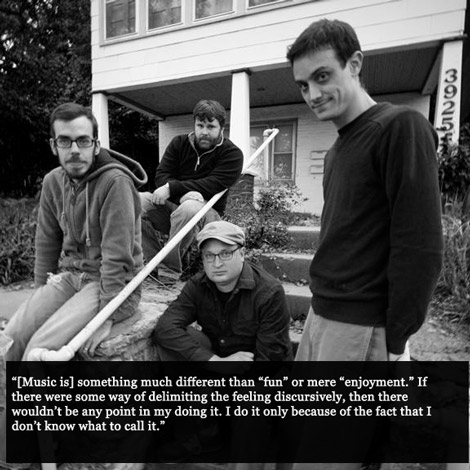
Scene Point Blank: Did you play "Chain Smoking" at all (sorry, it is one of my favorite songs that Coalesce did)?
Jes Steineger: Ha, sorry dude; that song hasn't been played since we recorded it. That was the only song that gave Dewees problems during that recording session (and only because we had just written it a few weeks before). Since we never really internalized the transitions before the recording and there never was anyone within the group who tried to force us to do so afterward, the thing just fell into "filler track" obscurity-land. We might pull that one out some day, but there are others higher on the band's request list at this point (e.g., "Still it Sells," "A New Language," maybe "Every Reason To" or "On Being a Bastard").
Scene Point Blank: How different is it playing live this time around than in 1998/1999 and the 2002 reunion tour (which was in larger clubs like the TLA in Philadelphia)?
Jes Steineger: Don't know about the '02 thing; wasn't there.
With regard to the difference with the '98 shows, I don't think there is much of a difference. It used to be that there might be some set of circumstances surrounding the show (e.g., some fight we got into in the van, stress about the fact that we were going to have to pay bills when we got home after yet another tour of losing money, personal problems internal to any one of us which we were trying to work out on our own), and then those circumstances would act as the condition for the catharsis that happened onstage. Things were dysfunctional and we couldn't figure out how to deal with the dysfunction. This time around, after having learned from our earlier experiences in coalesce that the world is fundamentally dysfunctional and having responded to that insight by somehow grounding our lives in some form of responsible stability on an individual level, Coalesce now provides a new kind of catharsis for us; one that purges any sense of excessive confidence we might make of responsible stability. What we look to in coalesce, functionally at least, is the same: for a point of departure from what counts as normal in our lives.
Scene Point Blank: How satisfying was releasing Salt & Passage (since your last new record came out in 1999)? Does Coalesce, at this point in time, have any plans for writing and or recording anything else?
Jes Steineger: It was so nice to do another session in the studio with Ed. I really love being in the studio and I think Salt and Passage captures exactly what Coalesce is as of 2005-2007. If the new full-length comes about, I am confident that this record set the necessary prerequisite for trying to do something more interesting than previous coalesce releases. Salt and Passage is like a rebirth; hence, why it's on the format it is and the length it is. And it mirrors what Coalesce was like when it first started: 002 and a few songs from Give Them Rope were written while three guys lived in Kansas City and I finished high school in Illinois. That's how it is now, except I'm trying to finish my doctoral work instead of high school.
Scene Point Blank: Coalesce also recently released a DVD set that was put together by the band, can people look forward to more of the same DIY type releases from the band? Or will the band continue to work with record labels and such for future releases?
Jes Steineger: I hope we can continue to do everything DIY. Part of the advantage of our situation is that Coalesce doesn't need some outside entity to fund it anymore. Hopefully that entails that future releases will retain a DIY honesty and simplicity that we've always wanted Coalesce to have. Since the market is so much different than it was in 1999, our relationship with Relapse is definitely going to be different. We're in the process of working that out now, but I'm confident that in the end we will have the freedom we require to do what we want. They have been really cordial, especially given our sporadic shenanigans.
Scene Point Blank: Are there any other Coalesce related rarities hiding somewhere (like demos or even side projects like the rumored American Spectator)?
Jes Steineger: Rarities: I hope not.
Side projects: Sean is doing a project called Deathbed Atheist, and from what I can tell, it is a reworking of the American Spectator project he started with some guys from Demon Hunter, Training for Utopia, and Frodus some years back. Ellis is in this incredible band called Able Baker Fox, which should have an album out soon. And last I heard, Jr was going to play in a few less bands so as to go back to school for formal music training. I have a project (not)called ~ but it's been sort of pushed to the back of my closet since Coalesce started taking more of my time with Salt and Passage and its supporting shows. I have four songs 90% done, but have lost my muse. If she ever comes back, I'd like to finish the project into a full-length, and perhaps do a couple splits with bands I really like.
Scene Point Blank: A history of Coalesce was recently published in Alternative Press. Were you happy with the end result? Was there anything that you feel they left out?
Jes Steineger: The end result was a consequence of the excessive capitalist circumstances we live in: all written content must be truncated to mere facticity and raped of any charm. It's no one's fault (i.e., not the editor's, nor the writer's, nor the buyer's). It's just the way the beast of our pseudo-culture operates; you can't take up 17,000 words in a magazine that can only provide space for 6,000 (the initial interview I gave Ryan, just on my own, was 30 pages). Fundamentally, anything that is written or spoken leaves out the fullness of an event; so matters are only made worse when you throw in the constraints of market conditions. What can you do?
All of us considered it extremely flattering that they wanted to do the piece, for sure, and the final version is fine given the constraints that they have to work within. We're hoping, however, that the editor will agree to let us print the original un-edited version on our website as the band's biographical history. The answers are fuller, there are additional people who were interviewed that weren't included in the printed version, and the story takes on a special kind of charm because of the variety of opinions. It'd be nice to supplement the un-edited version with more negative appraisals from our contemporaries in the late-90s and maybe some opinions from some current bands that don't understand why a magazine like AP would care about us.
Scene Point Blank: Was it strange having such an article written about the band?
Jes Steineger: It's always strange to have anything written about Coalesce. An article has to keep things short and sweet, which means in effect, that it has to dumb down reality exponentially. A webboard entry about Coalesce (or about anything, for that matter) is indicative of the absolute depravity of communication that has come about since the rise of that medium. And reviews can say anything they want, really. We've seen reviews for Salt and Passage that merely copy and paste portions of our promo sheet that gets sent out with the record. One can pick any reason to be disappointed: we don't sound enough like the "old Coalesce" (whatever the hell that means) and so it sucks, or we sound too much like the "old Coalesce" and are therefore caught in a 90s time warp of some sort. In the end, I never expect anything interesting from some written assessment of Coalesce.
Nevertheless, articles, webboards, and reviews still exist, and that being the case, I've learned to try and truncate my answers the best I can in the stuff I write, and hope that it'll be enough to point the reader in the general vicinity of the meanings I intend.
I definitely consider the AP article to be the best article that someone has ever put together on Coalesce. I think it's a great introduction to the group for a reader who has never heard of Coalesce before, despite (and maybe even especially because of) its brevity.
Scene Point Blank: It was a trip remembering some of the wild rumors surrounding the band back then. Did the band members have a similar experience retelling the story?
Jes Steineger: Actually, it's a trip to learn something new about how the other guys felt about those rumors, or about something that happened in general, rather than remembering the rumors themselves (they were always so banal to begin with, it only makes it worse to remember them). It only takes a little comment somewhere in an interview to learn something new about how one of the other guys felt. I learned a few things from the un-edited AP article, for sure. So there you go: a noteworthy value within interviews comes to light.
Scene Point Blank: If you were able to do anything over involving Coalesce, what would it be and why?
Jes Steineger: I wouldn't change one thing (including that part at the beginning of "Have Patience" that Stacy biffed and that has somehow miraculously eluded every re-editing, re-mixing, re-mastering, re-naming-freaking-whatever that Give Them Rope has gone through).
My only hope is that if this next full-length comes about, that it somehow embodies a spirit of estrangement against the current expectations at play in extreme music.
Words: Bob | Graphics: Matt | Photo credit: Jennifer Brothers


